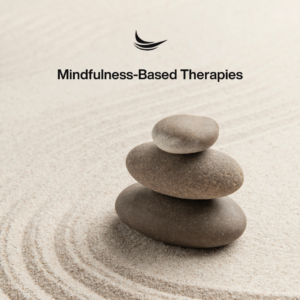Mindfulness-Based Therapies
 Meditation helps one become more present, utilizing the practice of being mindful. Perhaps you already have a basic understanding of meditation and the importance of mindfulness and want to expand your awareness. There are a lot of wonderful resources online to help incorporate mindfulness exercises into one’s daily routine. Working with a therapist can help you implement mindfulness-based interventions inside and outside of your sessions while improving your mental health. Did you know that there are therapeutic approaches specifically designed to incorporate mindfulness?
Meditation helps one become more present, utilizing the practice of being mindful. Perhaps you already have a basic understanding of meditation and the importance of mindfulness and want to expand your awareness. There are a lot of wonderful resources online to help incorporate mindfulness exercises into one’s daily routine. Working with a therapist can help you implement mindfulness-based interventions inside and outside of your sessions while improving your mental health. Did you know that there are therapeutic approaches specifically designed to incorporate mindfulness?
Mindfulness-Based Stress Reduction and Mindfulness-Based Cognitive Therapy are two types of psychotherapy that utilize mindfulness as a primary intervention. Mindfulness-Based Stress Reduction’s 8-week program was developed by Jon Kabat Zinn. Mindfulness-Based Cognitive Therapy is based on this framework and was modified by Zindel Segal, Mark Williams, and John Teasdale for individuals who suffer from chronic depression.
Mindfulness-Based Stress Reduction (MBSR) uses mindfulness and stress reduction interventions such as meditation, yoga diaphragmatic breathing, and gratitude journaling to help reduce stress levels. The benefits of Mindfulness-Based Stress Reduction not only help reduce stress but also help reduce pain and manage symptoms of anxiety and depression. There are formal MBSR programs which are typically 8-weeks. The Myrna Brind Center for Mindfulness-Jefferson Health (formerly known as the Mindfulness Institute) offers public programs and also has several free resources to learn more.
Mindfulness-Based Cognitive Behavioral Therapy uses cognitive therapy, meditation, and mindfulness. Mindfulness-Based Cognitive Therapy (MBCT) interventions target recurrent depression and chronic unhappiness. Mindfulness combined with Cognitive-Behavioral Therapy (CBT) can help reduce downward mood spirals, helping individuals focus on the present moment and more clearly see thought patterns. MBCT also works with one’s relationship to painful feelings, utilizing mindfulness to allow thoughts and feelings to come and go. Here are books to read that incorporate MBCT.
It is recommended to work with your primary care and mental health providers to help determine what approaches may be most effective for your presenting concerns as this varies depending on the duration and severity of symptoms. Those impacted by chronic pain may work with a physical therapist and a medical care team. Many patients benefit from a combination of interventions such as therapy and medication or psychotherapy supplemented with mindfulness-based homework to practice at home.
Written By: Charlotte Johnson, MA, LPCC



























